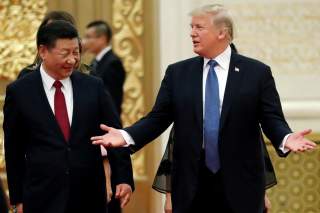Trump is Forcing China to Reassess its Strategy
Trump’s seeming unpredictability, and penchant for muscular showdown, has dramatically altered China’s risk calculations, forcing Beijing to constantly revisit its strategic assumptions.
In fact, the middle powers have also been pushing back against Trump’s trade protectionism and China’s predatory economics, including through debt-trap diplomacy—by pushing for sustainable and quality infrastructure investment initiatives—as well as major multilateral free trade deals—particularly the TPP-11, which is led by Japan, and the Regional Comprehensive Economic Partnership agreement, which is facilitated by Indonesia and the Association of Southeast Asian Nations. Japan and the European Union also concluded the world’s biggest bilateral free trading agreement in hopes of denting the fallout from Trump’s protectionism.
As early as 2013, Rory Medcalf and Raja Mohan, the two leading experts on “middle power diplomacy,” highlighted the considerable heft of Indo-Pacific middle powers of India, Japan, Indonesia and Australia. These nations have a combined gross domestic product, population and defense spending that is on par with—and, over coming years, could even exceed—China’s, especially as India and Indonesia continue their economic boom and defense buildup.
With the European powers of France and Britain, which have Indo-Pacific territories and interests, joining the naval scramble against China, middle powers are even in a better position to augment ongoing efforts to keep Beijing’s ambitions in check, arguably even irrespective of the vicissitudes of American power projection in Asia.
Thus, quite paradoxically, Trump’s unpredictability, and the seeming unreliability of America in extension, have proven as a catalyst for more middle power strategic proactiveness. Sure, many of them were already expected to increase their strategic commitments in the future, but one can’t deny that Trump’s unilateralism has forced a much-needed and timely strategic rethink among allies and partners in the Indo-Pacific.
Trump’s hedgehog-like leadership is still drenched in “big dangers,” but, at least for now, it has reset the Asian geopolitical landscape in many unexpectedly encouraging ways that were previously unthinkable. That’s the ultimate paradox of Trump’s presidency.
Richard Javad Heydarian is an assistant professor in international affairs and political science at De La Salle University. He previously served as a policy advisor at the Philippine House of Representatives and is the author of, among others, Twilight of Empires: Trump, China, and the Struggle for Mastery in the Indo-Pacific (forthcoming).

